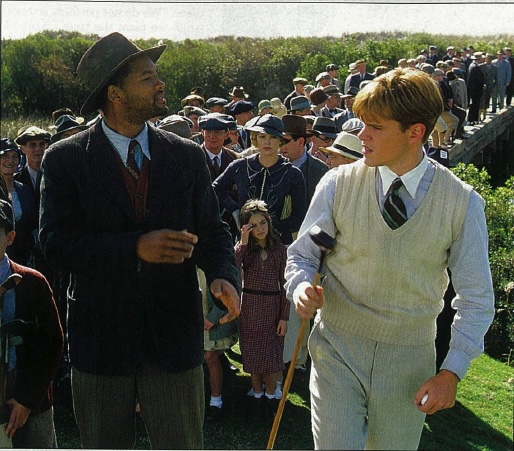By Steven Rosen
Robert Redford’s latest movie, “The Legend of Bagger Vance,” hit theatres in November, 2000, to mixed reviews but decent attendance numbers. A handful of reviewers (and fewer of the audience) were aware that this artfully filmed story of a golf game was actually a modern-day rendition of the Bhagavad Gita. Redford based the movie on the book of the same title by Steven Pressfield in which he creatively restructures the Hindu scripture, originally spoken on a battlefield, so that it now takes place on a golf course. In his work, Pressfield introduces us to the mysterious caddie known as Bagger Vance, a variation on Bhagavan, a name for Lord Krishna, who knows the parallels between the secrets of golf and the secrets of life, and the famed but troubled war hero, Rannulph Junuh, that is “R. Junuh.” Get it? Arjuna.
The setting of both movie and novel revolves around a golf tournament at Krewe Island, off Savannah, Georgia’s, windy Atlantic shore. The year is 1931, and we are transported into an impending 36-hole match. Bobby Jones and Walter Hagen, real-life legends of golf in their own time, are joined by Junuh, a reluctant opponent. The outcome of the game, we soon learn, depends on Bagger Vance, a caddie who carries the secret of “the Authentic Swing,” and works to instill it in Junuh. By movie’s end the angelic Bagger succeeds, Junuh learns the lessons of life and wins the tournament.
I read Pressfield’s novel at a single sitting, enthralled at the parallels with the Gita, which I have studied for 30 years. I called the author and congratulated him on a job well done. He said of all the reviews of his book, only one South Asian scholar recognized it as a retelling of the Gita. When I learned it was about to be made into a movie, and by Robert Redford, no less, I was inspired to write a second book, Gita on the Green (us$18.95, Continuum International Publishing, 370 Lexington Avenue, New York, New York 10017 USA), explaining the parallels between Legend of Bagger Vance and the Gita. Pressfield loved the idea and wrote the forward. In that forward, Pressfield candidly revealed that whenever he explained his book was based on the Bhagavad Gita, “You have never seen eyes glaze over so fast. A guaranteed conversation stopper.” Should he offer additional explanation, Pressfield said, “whoever I’m talking to enters a state of advanced stupefaction.”
The book is far more recognizable as the Gita than the movie. For example, this excerpt from chapter 13, which is not part of the movie: “‘Put the clubs away,’ Junuh said in a voice nearly inaudible. ‘I see no profit in them or this whole fool enterprise.’ ‘Your mind is clearly in torment, Junuh,’ Bagger Vance spoke slowly and evenly. ‘Tell me please: what is the nature of your complaint?’ Junuh glanced up sharply at this word, which seemed to trivialize his emotion. ‘It couldn’t be more obvious, could it? This whole endeavor is a freak show. A joke. What good will any of it do me, or anyone attached to it?’ Junuh’s hands were trembling. He ran them in pain through his hair, eyes gazing hollowly before him into the dunes, ‘What is ever gained by defeatingâ others? What can be gained here today? If I win I take no pleasure, and if I lose….'”
This correlates to the first chapter of the Gita which begins, “Arjuna said: ‘O infallible Krishna, please draw my chariot between the two armies. I want to see who is present here, who is desirous of fighting, and with whom I must contend in this great battle.'” And later, “Arjuna said: ‘My dear Krishna, seeing my friends and relatives present before me in such a fighting mood, I feel the limbs of my body quivering and my mouth drying up. In fact, my whole body is trembling, and my hair is standing on end. My bow is slipping from my hand, and my skin is burning.'”
There are also some aspects of the book–and more of the movie–which have no relationship to the Gita, or distort the Gita’s concepts. Nevertheless, when read with the Gita in mind, Bagger Vance can swing with the best of them, illuminating eternal truths that might otherwise fall into the worst of sandtraps, oblivion
